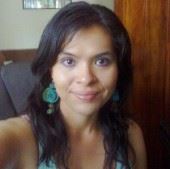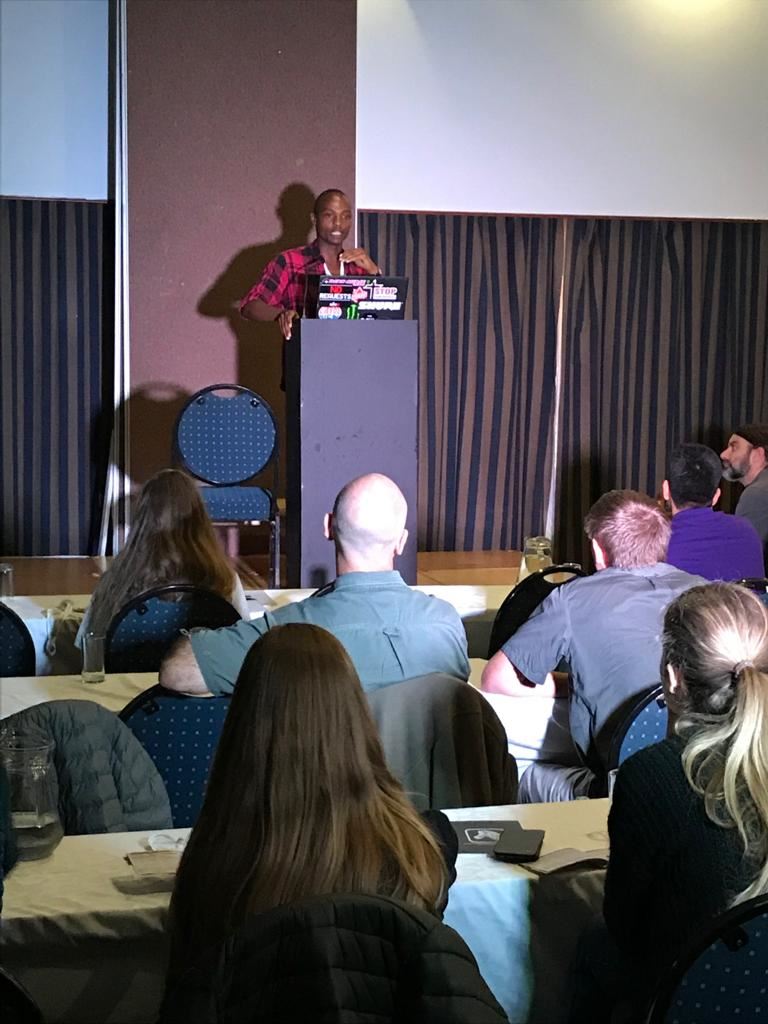 From the President
From the President
AWMS plays an important and leading role in the application of applied, adaptive, best-practice wildlife management. This, coupled with our support and encouragement of our student members, is, in my opinion, what sets us apart from the rest. Once again, students were well represented at this year’s conference, with high quality science and presentations on show.
This year the AWMS committee has been working hard behind the scenes. Most recently we have been working on a joint position statement on the welfare and conservation implications of overabundant macropods. This has been developed through special symposia held at both the Australasian Rangeland Society and Ecological Society of Australia’s conferences. AWMS was a co-convener of these symposia. The AWMS committee has provided feedback on the draft joint statement and will circulate a final draft to members once it is available.
The Committee is always looking at opportunities to provide benefits to members. This year we subsidised conference registration costs for members, reducing costs by $100. Ben and I have also been exploring other member benefit opportunities, and while we are not at the point of being able to announce anything just yet, negotiations continue and we hope to bring you some exciting news in the not too distant future.
Our relationship with SAWMA continues to strengthen. AWMS and SAWMA take it in turns hosting a member at their respective conferences. This year it was our turn to send an AWMS representative to the SAWMA conference. Jim Hone attended as the AWMS representative and you can read about his trip in this newsletter. Next year SAWMA is celebrating 50 years. I encourage all of you to try and attend these celebrations in September 2020. Keep an eye on our website for further information.
Our own AWMS conference this year was a great success. We haven’t been to Darwin for 20 years, so it was time for us to head back. I’d like to thank the local organizing committee for putting together a great event, and as always, thank our sponsors and trade exhibitors for making the effort to come and see us in Darwin. Next year’s AWMS conference is heading across the ditch! We’ll be in Dunedin, New Zealand from 1-3 December 2020.
At the AGM, new committee members were elected. I’d like to take this opportunity to thank all of the committee members for their efforts and dedication over the last 12 months. In particular, Tom Newsome, Ben Allen, Mike Braysher, Sarsha Gorrinsen, Miquel Brandimarti and Pip Masters who have finished their time on the committee in their current roles.
Finally, as 2019 draws to a close, I’d like to wish you all a safe and happy festive season. Take care on the roads for those of you that are travelling and I look forward to seeing what the next 12 months brings.
Tarnya Cox 
 from the editor
from the editor
I became a member of AWMS in 2017 when I was a PhD student and had the opportunity to be the media officer. Last April I was honoured to become the Newsletter editor; I would like to thank the previous AMWS editor and now president Tarnya Cox.
AWMS will continue to have three newsletters throughout the year making sure that you always receive all the relevant information as members of AWMS including conference updates, members publications, announcements, awards winners and from time to time there will be special sections.
In this issue you will find a special section “AWMS and SAWMA strengthen links” where Jim Hone and Kudzai Mpakairi talk about their impressions about SAMWA 2019. You will also find the 2018 AGM, updates in the AWMS website including member benefits, jobs board and the history of AWMS and next year's conference venue (but if you already read the from the president section and attended the conference, most likely you already know).
For any feedback and/or contributions to the newsletter please contact me at newsletter@awms.org.au I am sure there are lots of interesting and exciting stories out there, especially from our student members. You can also follow AWMS on social media or send an email to media@awms.org.au and share your stories and photos #AWMS2019 #AWMS2020 #Management #WildOz or create your own hashtag.
Facebook - Australasian Wildlife Management Society
Twitter - @AWMSociety
Instagram - @awmsociety
Linkedin - Australasian Wildlife Management Society
I hope you enjoy the last issue of 2019. Looking forward to hearing from you in 2020!
Happy holidays
Margarita Medina

agm 2018 announcement
On Wednesday December 04 2019 at 4:30 pm, the General Meeting was held during the Conference in Darwin.
2018 AGM Minutes
Website content Updates
Check out the new content on the AWMS website:
The Australasian Wildlife Management Society: a 30-year journey
Discover how AWMS began, where and when was the first conference held and activities performed over the last 30 years.
https://awms.org.au/AWMS-30-years
Jobs Board
Currently with six jobs advertised and if you are a member and currently looking for a job, you can advertise your CV here.
https://awms.org.au/Jobs-Board
Member Benefits
Become a member of AMWS, check out the latest member benefits. More coming soon!
https://awms.org.au/Membership

AWMS and SAWMA strengthen links
The SAWMA and AWMS affiliation aims to further communication, cooperation and opportunities for professional development for their members, and for scientific management of wildlife in southern Africa and Australasia. You can read more about this affiliation here https://awms.org.au/Affiliations
This year Jim Hone attended the SAWMA conference as the AWMS representative and gave a keynote talk answering the question “How should wildlife conservation be evaluated?”. AWMS also sponsored Kudzai Mpakairi a master’s student at the University of Zimbabwe to attend SAWMA.
Lastly, in September 2020 SAWMA will be celebrating 50 years! More information coming up in the AWMS and SAWMA website.
How should wildlife conservation be evaluated?
Jim Hone
University of Canberra
Jim.Hone@canberra.edu.au
A keynote talk by Emeritus Professor Jim Hone answered the question during the recent 2019 annual conference of the Southern African Wildlife Management Association (SAWMA) in South Africa. He described three methods of conservation evaluation – trends in abundance, relationships between conservation efforts and outcomes, and combining trends, outcomes and efforts. Within each method there is a change from weakest to strongest inference that there was a relationship, and what caused it. For example, strongest inference that management caused the observed outcomes comes from replicated, randomised, controlled and analysed experiments that evaluate a range of management efforts, with successful prediction of outcomes using independent data. The research is based on work done collaboratively with Dr Alistair Drake and Professor Charley Krebs of the Institute for Applied Ecology at the University of Canberra.
There were five themes at the SAWMA conference. These were; Managing biodiversity in the face of disturbance and extreme events; Methods and approaches for wildlife management and conservation; Social-ecological approaches to wildlife management; Conservation management and its effects on species, food webs and ecosystem functioning; Wildlife management in peri-urban landscapes. Many of the topics in talks were similar to those at AWMS conferences, however the species were quite different obviously. A post-conference field trip to nearby areas of fynbos and an estuary highlighted many ecological and wildlife issues. The SAWMA conference was attended by about 170 wildlife scientists and managers from South Africa and nearby countries such as Zambia, Zimbabwe, Namibia and Botswana, as well as from further afield including Iran and Columbia. Attendees were scientists, managers, and postgraduate students.
Participation at the conference by Jim Hone was assisted financially by AWMS and SAWMA under an affiliation arrangement to facilitate closer links on wildlife management. The assistance is greatly appreciated. The next SAWMA conference, the 50th, is planned for 6 to 11 September 2020 in Kruger National Park. It should be a great conference and is being held in a fascinating location with lots of wildlife and management issues. Attendees from AWMS should benefit by learning new approaches to wildlife management and about different wildlife. Further details will be available soon at www.sawma.co.za, and further details of the 2019 conference can be obtained from Jim Hone (Jim.Hone@canberra.edu.au) or at the SAWMA website.
.jpeg) Keynote speakers SAWMA 2019. Herve Fritz, Chloe Guerbois, Jim Hone and Tineke Kraaij
Keynote speakers SAWMA 2019. Herve Fritz, Chloe Guerbois, Jim Hone and Tineke Kraaij
Kudzai attends SAWMA 2019
Kudzai Mpakairi
University of Zimbabwe
I left Zimbabwe in the early morning hours and in an hour, I was in Johannesburg ready to get on to the next connecting flight to the Western Cape in South Africa. I was really geared and rearing to go and attend the SAWMA 2019 Conference since it was my first time.

As a master’s student, with a handbook and a keen look, I sat attentively throughout the presentations until the last day. The presentations were exceptional, and could not be missed for anything.
Of interest, was the keynote address by Dr Herve Fritz on ‘Web of Ecological Interactions and indirect effects of management decisions’ .
Attending SAWMA was a lifetime experience that I would never forget, all thanks to Australasian Wildlife Management Society. The SAWMA 2019 Conference, made me appreciate the importance of scientific rigor and the need to connect with people from other walks of life. As an emerging researcher and student, I intend to attend more conferences and learn and impart knowledge where I get the chance.SAWMA was wonderful.
Kudzai Mpakairi presenting at SAWMA 2019.

2020 conference announcement
Save the date! In 2020 AWMS will be held in Dunedin, NZ. Further information will be provided in the upcoming months.
See you in Dunedin #AWMS2020.
Happy Holidays!
